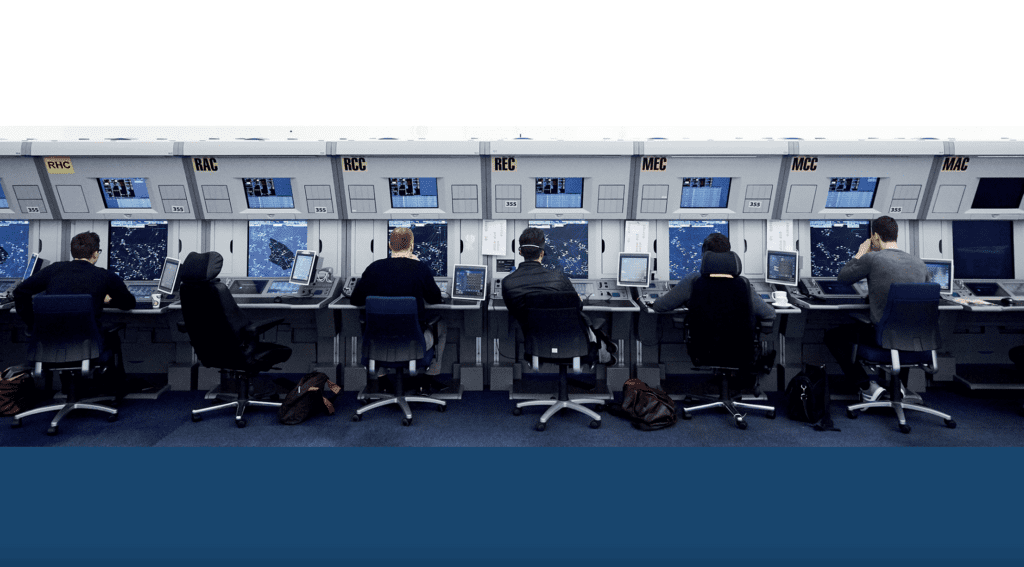
Eurocontrol recently released a think paper on whether improving air traffic controller mobility could improve capacity and scalability for airlines. (Photo: Eurocontrol)
Air traffic controllers are soon likely to get the same convenience as remote workers since Eurocontrol, the European Organization for the Safety of Air Navigation, sees remote air traffic control as a solution to the unpredictable demand within European airspace.
Being an air traffic control operator (ATCO) can be an intense and stressful job. Still, it is nonetheless one of the most necessary jobs in the aviation industry because without it, air travel would not be feasible or safe.
Recently, the commercial aviation industry in Europe has been suffering financial losses due to ATCO capacity and staffing issues. Airline businesses are losing both time and money, and Eurocontrol is investigating a potential solution: implementing more air traffic control operator mobility.
The implementation of increased ATCO mobility could create a more dynamic and adaptable air navigation service in European airspace. Traditionally, ATCO mobility refers to a staff member physically relocating to another airport, or more specifically, an air control center (ACC).
ATCOs are responsible for air traffic flow management (ATFM), which is the process of organizing and directing incoming/outgoing air traffic. An ATFM delay, for example, could be an aircraft maintaining a holding pattern around the airport for an extended period of time. This is not ideal due to the fact that the airliner is burning fuel and wasting time.
In Eurocontrol’s recent Think Paper, from January to November 2022, they determined that out of the 15.7 million minutes of ATFM delay time, 47% of that time was due to ATCO capacity and staff shortages. “ATC staff shortages amounted to 7.43 million minutes for the first 11 months of 2022. Using the European airline delay cost value of €109/minute of delay, this has cost airlines over €800 million so far in 2022,” Eurocontrol established. In U.S. dollars, that is about $116/minute, or a total of $851 million.
The problem lies in that the demand for ATCOs can rapidly change throughout the course of the week or even the day. A more responsive solution than physically relocating ATCOs would clearly be beneficial.
Hence, Eurocontrol introduced the idea of Cross-border ATC Provision. With the help of modern technology, ATCOs can control airspace remotely from an ACC that is not actually near the airspace. Within Europe, states under specific agreements and proper legislation would then have the ability to control one another’s airspace if necessary.
Eurocontrol explained, “Scalability is an attractive feature of this approach as it gives flexibility to assign controllers to the sectors where the need is the greatest at any given moment, irrespective of the national boundary or ACC in which the controller is located.”
By implementing cross-border ATC provision, European airspace will become more dynamic to the seemingly unpredictable demand for air traffic control. A given sector may not have much air traffic and those ATCOs could be utilized more efficiently by reassigning them to busier airspace. In practice, this would reduce delay times and allow for a more economically efficient system.
In Europe, there are already air navigation service providers (ANSPs) that are implementing cross-border ATC provision. As mentioned in Think Paper, Maastricht UAC, Netherlands has been utilizing ATCO mobility for 50 years. The Maastricht UAC is “managing air traffic in the upper airspace of Belgium, Luxembourg, The Netherlands and the north-west of Germany.” Interestingly, the delegation of airspace is cross-border, but all of the ATCOs are stationed within Maastricht, providing remote airspace coverage.
Implementing cross-border ATC provision is no easy task, however. Among countries, there is a concern of national security, “Under the Convention on International Civil Aviation, each State has complete and exclusive sovereignty over the airspace above its territory,” Eurocontrol acknowledged. The European Commission Regulation has established a common licensing scheme to allow for a “mutual recognition of licenses and facilitate the free movement of air traffic controllers across Europe,” which aims to standardize air traffic control and eliminate knowledge barriers.
ATCO conversion training should also be optimized; by reducing the time it takes to convert ATCOs to a different kind of airspace, it will encourage ATCO mobility. Conversion training is when an ATCO “continues to work in the same airspace sector but something fundamental has changed.” If an ATCO was managing the approach sector of an airport and moved to the tower sector, this would require conversion training.
This isn’t very straightforward, though. “When an ATCO converts from one set of sectors to another, the length of time it takes is dependent on a number of factors that affect the philosophy of how the airspace is managed.”
Although only time and implementation will indicate whether it is a viable solution, ATCO mobility might be the future of airspace management. Eurocontrol anticipates the potential for a more efficiently maintained airspace in Europe that will not only remain safe but also reduce downtime and save money.